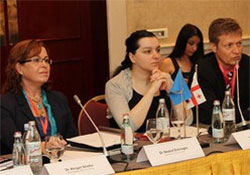Caucasus countries make plans to end measles outbreaks

NCDC, Georgia
Over 9200 measles cases have been reported to WHO since the beginning of 2013 in the Caucasus and Turkey: 64% of the total in the WHO European Region. Outbreaks are causing widespread concern and threatening the goal of eliminating measles and rubella from the Region by 2015. Georgia and Turkey have reported the majority of these cases.
Given the scale of the outbreaks, all affected and neighbouring countries need to act quickly, taking appropriate prevention and control measures. To ensure a coordinated response, WHO/Europe organized a high-level meeting that took place on 10–11 July 2013 and was hosted by Georgia. The participants comprised representatives of Armenia, Azerbaijan and Georgia, and experts from WHO, the Rostropovich-Vishnevskaya Foundation (RVF), the United States Centers for Disease Control and Prevention (CDC) and the United Nations Children’s Fund (UNICEF).
Cross-border collaboration crucial for measles control
While measles immunization coverage has increased sharply around the globe since the 1980s, recent declining coverage rates in some countries and persistent gaps in routine immunization have led to an accumulation of susceptible individuals. Based on shared lessons learnt from previous outbreaks, the countries attending the meeting agreed on concrete plans for the coming year to prevent further spread of the disease among these populations within and across their borders.
These plans include identification of:
- the optimal target groups for supplementary immunization activities;
- vaccine delivery strategies;
- measles-containing vaccine of choice;
- communication capacities required;
- surveillance needs; and
- funding opportunities.
The participants also discussed ways to prevent outbreaks over the longer term through stronger routine immunization, improved surveillance and follow-up supplemental immunization activities to eliminate gaps.
All participants agreed on the importance of effective communications and health-care workers’ crucial role in influencing vaccination behaviour.
Partner support
Based on the countries’ plans and identified needs for the coming year, the partner organizations represented at the meeting explored ways of providing support to facilitate immediate implementation.
2015 elimination target
In September 2010, the WHO Regional Committee for Europe set 2015 as the target date for the elimination of measles and rubella from the WHO European Region. Key strategies to achieve this goal include sustaining more than 95% vaccination coverage across all populations in the Region and strengthening disease surveillance systems.



